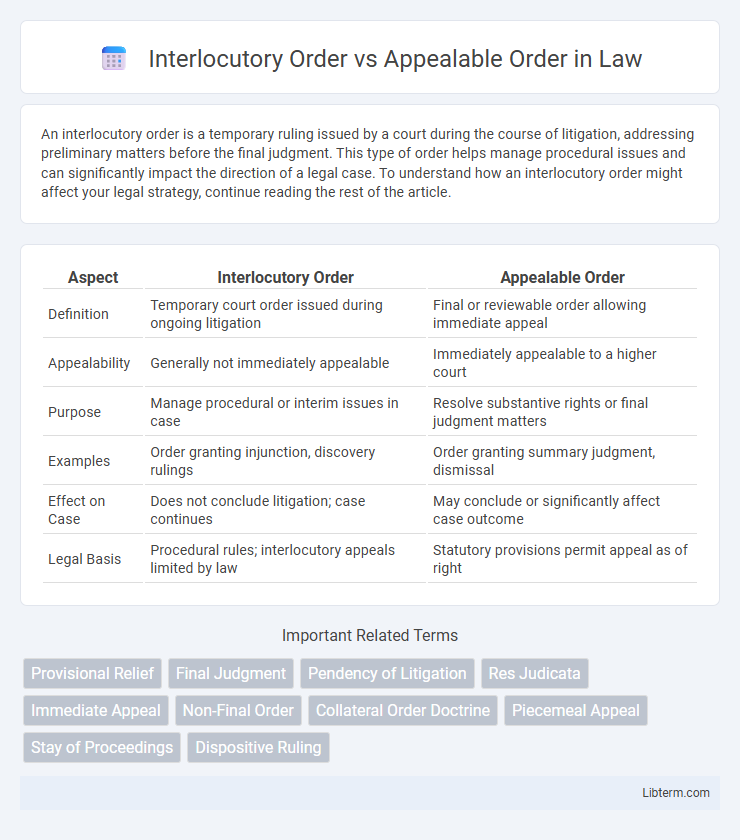An interlocutory order is a temporary ruling issued by a court during the course of litigation, addressing preliminary matters before the final judgment. This type of order helps manage procedural issues and can significantly impact the direction of a legal case. To understand how an interlocutory order might affect your legal strategy, continue reading the rest of the article.
Table of Comparison
| Aspect | Interlocutory Order | Appealable Order |
|---|---|---|
| Definition | Temporary court order issued during ongoing litigation | Final or reviewable order allowing immediate appeal |
| Appealability | Generally not immediately appealable | Immediately appealable to a higher court |
| Purpose | Manage procedural or interim issues in case | Resolve substantive rights or final judgment matters |
| Examples | Order granting injunction, discovery rulings | Order granting summary judgment, dismissal |
| Effect on Case | Does not conclude litigation; case continues | May conclude or significantly affect case outcome |
| Legal Basis | Procedural rules; interlocutory appeals limited by law | Statutory provisions permit appeal as of right |
Introduction to Interlocutory and Appealable Orders
Interlocutory orders are rulings issued by a court during the course of litigation that do not dispose of the entire case but address preliminary or procedural matters. Appealable orders, on the other hand, are specific judicial decisions that can be challenged immediately on appeal, often including final judgments or certain interlocutory rulings expressly authorized by statute. Understanding the distinction between interlocutory and appealable orders is crucial for determining the timing and scope of appellate review in civil and criminal proceedings.
Definition of Interlocutory Order
An interlocutory order is a judicial directive issued during the pendency of a case that decides preliminary or procedural matters without finally resolving the main controversy. Unlike appealable orders, interlocutory orders generally cannot be immediately challenged on appeal, except in specific situations prescribed by law. These orders help manage the progress of litigation by addressing interim issues such as motions, injunctions, or temporary relief.
Definition of Appealable Order
An appealable order is a judicial decision that can be immediately challenged in a higher court, typically because it conclusively resolves a substantial issue in the case. Unlike interlocutory orders, which are provisional and address preliminary matters, appealable orders have finality on certain questions of law or fact. Courts identify appealable orders based on statutory criteria or rules of procedure defining when a ruling is sufficiently decisive to warrant an appeal.
Key Differences Between Interlocutory and Appealable Orders
Interlocutory orders are temporary rulings made during the course of litigation that do not dispose of the entire case, whereas appealable orders are final decisions resolving significant issues or the entire controversy, allowing parties to seek appellate review. The key difference lies in their appealability: interlocutory orders generally cannot be appealed immediately, except under specific legal exceptions, while appealable orders permit direct appeals as a matter of right. Understanding this distinction impacts case strategy, as interlocutory orders often require motions for reconsideration or certification to be reviewed before final judgment.
Legal Significance of Interlocutory Orders
Interlocutory orders are judicial rulings made during the course of litigation that do not resolve the main issues but address preliminary or procedural matters, often lacking finality for immediate appeal. Their legal significance lies in facilitating the progression of a case by providing timely decisions on essential but non-dispositive issues, ensuring procedural fairness and efficiency. Unlike appealable orders which conclude litigation phases and can be challenged immediately, interlocutory orders generally require the case to proceed to final judgment before being subject to appellate review.
Legal Implications of Appealable Orders
Appealable orders are final judicial decisions that resolve substantive issues, allowing parties to seek review by higher courts and potentially reverse or modify the ruling. These orders carry significant legal implications as they directly impact the enforceability of rights and obligations, often determining the course of litigation without further trial proceedings. Understanding the distinction ensures timely filing of appeals, preserving parties' rights to judicial scrutiny and preventing waiver due to missed deadlines.
Criteria for Appealing Interlocutory Orders
Criteria for appealing interlocutory orders focus primarily on the presence of a substantial right that would be lost without immediate review, causing irreparable harm that cannot be adequately remedied by a final judgment. Courts require that the order significantly affect the case's outcome or the rights of parties beyond mere procedural rulings, ensuring the appeal is necessary to prevent injustice. The appealability of interlocutory orders is also governed by statutory provisions or specific rules of civil procedure that delineate which preliminary decisions qualify for immediate appeal.
Examples of Interlocutory and Appealable Orders
Interlocutory orders, such as temporary injunctions, stay orders, and bail grants, address intermediate or procedural matters during ongoing litigation without finally deciding the case. Appealable orders include final judgments, orders granting or dismissing injunctions, or decisions on summary judgment motions that effectively conclude a legal issue or the entire case. Understanding these examples helps distinguish between orders that can be challenged immediately and those requiring the end of trial for appeal.
Judicial Precedents on Interlocutory vs. Appealable Orders
Judicial precedents establish that interlocutory orders, which are temporary and issued during the pendency of a case, generally lack immediate appealability unless expressly provided by statute or exceptional circumstances. Courts have consistently held that only final or appealable orders resolve substantive rights conclusively, as seen in landmark decisions like *Cohen v. Beneficial Industrial Loan Corp.* and *Mallard v. United States District Court*. The distinction ensures judicial efficiency by preventing piecemeal appeals, reinforcing that interlocutory orders require leave or specific legal grounds for appeal.
Conclusion: Choosing the Right Legal Path
Selecting between an interlocutory order and an appealable order hinges on the case's urgency and impact on the final judgment. Interlocutory orders address intermediate issues but often require special permission to appeal, whereas appealable orders conclude critical legal questions warranting immediate review. Understanding these distinctions ensures strategic litigation choices, optimizing judicial efficiency and client outcomes.
Interlocutory Order Infographic

 libterm.com
libterm.com